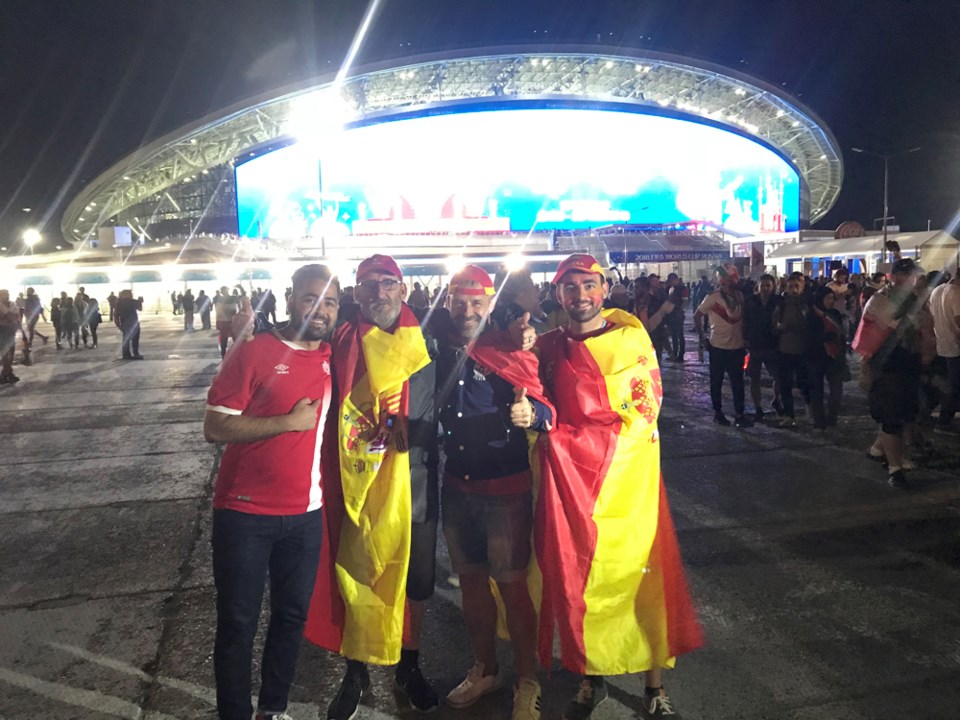Twenty-two hours on a cramped train is not something I’d recommend to the faint of heart.
And it’s not something I’ll readily jump at the opportunity to do again, unless the accommodation is something other than four stinky, sweaty men in a comportment. Even though, I’ll add, the train looked recently renovated.
Alas, we made it to Kazan, the site of Iran’s second game vs. the recent European (2008, 2012) and World (2014) Champions, Spain.
I only managed enough time to drop off my bag, get a quick shower, then head to grab a bite and beer before the game. As I’ve mentioned before, getting to the stadium early is a wise strategy. Some have seen lines stretching quite long even two hours before game time.
You might have noticed lots of empty seats to start the games. This is why. Another reason may be that the games aren’t actually all sold out. Only 42,000 of the 45,000 or so that could fit into Kazan stadium were filled. Filled, to my pleasant surprise, with a majority pro-Iranian crowd. My uneducated hunch told me that roughly 60 per cent of the crowd was cheering for Iran, with 20 per cent filled with locals/fans of other teams and 20 per cent for Spain.
The game itself was obviously a one-sided affair, with Spain applying consistent and heavy pressure, and Iran playing a strong defensive game in quelling them for roughly 54 minutes. It wasn’t until a late deflection goal by Spain that put them ahead. Iran would respond with a number of great chances, even capitalizing on one, only for it to be called offside. For viewers at home, it was probably a quick explanation. But we in the stadium were left wondering what happened. The irony wasn’t lost on many of us: four years ago, Iran lost 1-0 to Argentina where a sure penalty was not given (no replay then), that would have put Iran ahead. This time around, they avoided drawing because of replay.
The game ended with many of the Iranian players falling in anguish, but their effort did not go unnoticed, as they received a rousing ovation.
During the game I tried their excuse for a hot dog (not good) and finally got to use one of their world famous four-beer cardboard containers. Here’s hoping those arrive in Canada soon.
The streets afterwards were quite tame, with a little encouragement from the local police - it was a Wednesday night, after all. Many opted for a quiet late dinner.
The next morning I rose for my 10 a.m. train to Moscow, only 12 hours in length, a leisure compared to my previous experience.
In the bar/food cart, a lively discussion emerged among Mexicans, Scots, and Americans. The conversation covered our so-far pleasant experience in Russia, and invariably turned to what’s ahead of us: Qatar 2022.
Where Russia is the largest country in the world and a boasts a rich history, Qatar is tiny, with few and far between historic landmarks to see. It’s also something to consider that it takes about three hours to get to any point in Qatar, compared to the long travels I’ve been telling you about in Russia. What will one do, if they want to follow their team through group stages - which covers two weeks? Die of boredom surely isn’t on the minds of the hosts. Maybe neighbouring countries like Saudi Arabia and Iran will open their countries to the hordes of soccer fans? Doubtful, because, well, if you haven’t heard already – soccer fans like to drink beer. So much so that Russian bars are running out! I can confirm this, as my favoured lager at a local establishment in Saint Petersburg ran out one evening, forcing me to drink my not-so-fave brand.
That in itself brought up another topic of discussion: what will drinking be like in the Muslim country? FIFA rules require alcohol at sponsored events (games and fan festivals), and Qatar must oblige. But will they oblige to a drinking on the street? To hordes of drunken soccer fans signing their nation’s songs late into the night? And how will the locals react to the rabid footy fans? Will they open their arms like Russia has, or act coldly to the loud, sometimes obnoxious and raucous crowds that will descend on their cities? And will they descend? As mentioned before many of the Russian games have not been sold out. If a country so close to Europe can’t fill stadiums, will one in the Middle East? These are all, I think, important questions. But alas, they are for another day. Right now, I’ve arrived in Moscow, the next part of this adventure awaits.
Nick Hosseinzadeh is a Canadian with Iranian heritage and a longtime resident of the North Shore. He’ll be sending back regular dispatches during his time in Russia to give our readers a feel for the World Cup away from the TV cameras.



